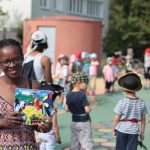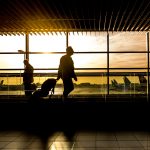I hate to travel. Travelling is for people who believe that something is missing within; something they can find in another part of the world. I am not an Eat-Pray-Love kind of person. I eat homegrown matooke. I have prayed at the same church for decades, and I’m still coming to terms with love in a third-world country. My little pond is good enough for me. It has organic food and brown soil I can walk barefooted on. It has brown people like me who do not side-eye me when I squat to take photographs of weeds.
However, in 2011, my sister suggested that we go for a family vacation. We set aside an Earl Grey tin she had purchased in England and started saving towards a trip out of Uganda. Unbelievably, I got excited. The problem is, the coins in the tin could fall out if you tilt it in a specific way. It started with a medical crisis. We took out some money to solve that. Then came the school fees, the matchboxes, and the soft loans that we never repaid.
Eventually, we ate our trip for dinner and got another tin.
Then came 2012. That year I had a black weave with red streaks, but all the world saw was the red. That year, my sisters and I – the University student without a coin – decided to save up for a Christmas trip. More ambitious this time, we bought three sets of two-piece bikinis. Mine was yellow with pink polka dots.
That same year, my mother got cancer, a story for another day. Engulfed in Mum’s cancer, we put our bikinis away and took up the duties of caring for a parent. We fought the battle together and lost it. Upon losing our mother that year, the spirit of travel (and money) was lost with many other parts of us.
Read – That there may be a Better Tomorrow – An Article by Ari-Ajia Olanrrwaju, Nigeria
Thrown back into the grind of making a living, we learned the power a parent had in holding you firmly to your soil. My habitat was no longer a place I was comfortable in; I was duty-bound to stay in it for my father’s sake.
Most Ugandans do not have the luxury of dreaming for more than their supper. The hand-to-mouth culture in some African homes prohibits our travelling habit as snow prohibits sunbathing.
For the first time, I wanted to escape.
The chance to travel came alive as an educational retreat. I got excited although it wasn’t the kind of trip that required two-piece bikinis.
This trip would lead us to Kenya in July. Throughout 2018, the organizers warned us that we’d be cold. We, therefore, packed two bomber jackets (for the three of us), three scarves, and two head socks. My bag was as small as a kindergartener’s, courtesy of my poor training in the Art of Travel.
Loaded into an enormous bus, we bumped through the potholed roads of sunny Kampala to ominous Langata.
The journey was a blur of aching knees and the sound of three jaws chewing on crisps with a hint of garlic flavour. I realized we were in Kenya when I awoke for a toilet break at a petrol station I didn’t recognize. Instead of the sunny July I had left in my homeland, it felt like a rainy day in November. We suffered such weather only during our senior six candidature in Uganda and were dramatic enough to compose songs about the hurdles of studying in November. That was just the beginning of my loss of Uganda.
Read – The Tomorrow People – An Article by Chris Baah, Ghana
I had always believed that there is a stark difference at country borders. You should have seen my disappointment when we arrived at the Kenya-Uganda border that dreary half-Ugandan half-Kenyan July night.
It was a bland room with a television overhead and men who carried Kenyan shillings and spoke in Luganda as though they couldn’t smell the change in the air.
The first shock in Kenya was the colour of the soil. Unlike Ugandan’s bulky trees with glossy leaves that block the sky from view, the vegetation I saw had leaves that resembled crystallized green cobwebs, electrocuted out of the ground. I blamed it on the grey soil.
The houses blowing past in the bus window had brick walls without any plaster; to my uneducated eye, they looked naked.
Kenya, I had decided, was unimpressive—until we got into Karen where the surroundings were one large elegant town. Tall, intricately carved archways mimicked the structures along John Babiiha Avenue, an expensive lane in Uganda, with all windows long and graceful like French doors.
Cruising through the intimidatingly unpotholed roads, we finally reached our lodgings, a girls’ dormitory located more than five stone throws away from our destination. At this time, we had run away from Uganda where a new tax on social media had begun stinging its citizens. Running to neighbouring Kenya, a social-media tax haven, seemed like an act of rebellion. We enjoyed the adrenaline rush until we saw our thin beddings. It was just two o’clock in the afternoon, but the cold had begun creeping under our fingernails. By nightfall, our teeth rattled each time we talked.
That first night, I bathed only my legs in the icy water and fled to my bed to regain my lost body heat. There was no memory of home between these sheets. With my bomber jacket on and my head mitten askew, I still shivered like the Europeans I saw on television. Never in my life had I slept in a bed that took warmth from me and gave none back. As soon as I’d roll to the other end of the bed, the sensation of sleeping on iron sheets would frighten me back onto my original corner. I spent that dreadful night singing the Ugandan anthem.
Read – Dreams of Tomorrow – An Article by Alliance Ankiambom, Cameroon
The next morning, we rose bright and early for breakfast. Lining up for breakfast that woefully foggy morning, I saw a falling wind for the first time. In normal climates (read Uganda), there are only two options: it is either raining, or it isn’t. Our weather does not play hard to get. Our wind does not fall in tiny, devious pinpricks of water. My face was damp with that eerie cold by the time I made it inside the hall.
A man in an orange tee-shirt leaned against a wall, watching our teeth smash against each other in comical cacophony.
“You are Ugandans, aren’t you?” he observed with an amused smile.
“What g-g-gave us a-a-away?” I asked, hugging my three sweaters and jacket closer to my body. I had fur-lined leggings and fur-lined boots but still felt the cold turning my blood blue. The only thing I hadn’t worn was the hostel blanket.
All he wore against the vicious cold was a cheeky expression. He smiled.
“It shows.”
This article was published in the April 2022 edition of the WSA magazine.
Please click here to download the Magazine.
This Magazine is published by a team of professionals and downloadable for free. If you would like to support our work, please buy us coffee – https://www.buymeacoffee.com/wsamagazine







